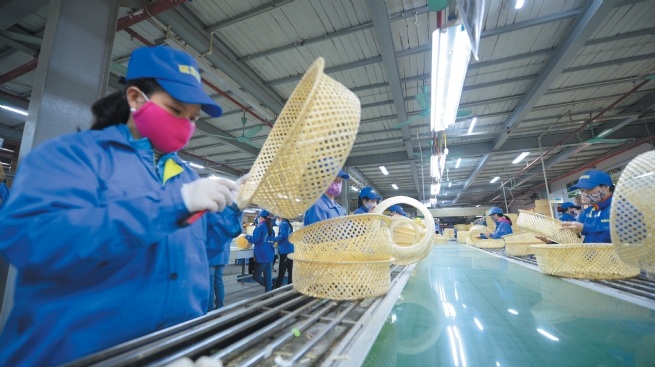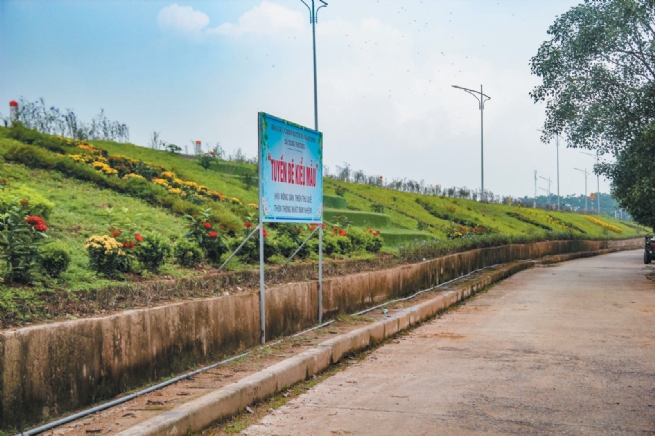9:46:11 AM | 8/26/2024
Developing new rural areas in Hanoi not only modernizes and refines its appearance but also profoundly transforms the lives of the local farmers.

Developing new rural areas in Hanoi modernizes its appearance and significantly enhances the lives of local residents
Developing OCOP products strategically
Nguyen Xuan Dai, Director of the Hanoi Department of Agriculture and Rural Development, reported that in early 2024, localities prioritized consolidating the board responsible for One Commune One Product (OCOP) development and district-specific products. Additionally, efforts were directed toward refining the OCOP product evaluation and ranking councils at the district level to ensure effective management and to facilitate annual evaluations and rankings of OCOP products.
Localities actively supported entities in developing and upgrading OCOP products, creating profiles for evaluation, and enhancing promotional efforts. They also coordinated tourism promotion to boost the visibility and appeal of OCOP products.
Since 2022, Hanoi has had its first two OCOP products evaluated and classified as 4 stars: Phu Dong Green Park in Gia Lam District and Hong Van Rural Tourism Service Site in Thuong Tin District. For the pilot project aimed at developing two destinations, namely Van Phuc Silk Village and Bat Trang Pottery Village, the goal is to establish them as community tourism and rural tourism points under the OCOP program. Currently, efforts are focused on reviewing and adjusting the location and design plans for several features, following the guidance of the Hanoi People's Committee.
Hanoi has recognized developing community tourism products and tourist areas as a key objective of Program 04-CTr/TU for 2021-2025. The city aims to advance the OCOP program in tandem with enhancing craft villages and traditional occupations, while also improving the quality-of-service sectors that support industry and agriculture.
During the period from 2023 to 2025, Hanoi prioritizes the development of high-efficiency service sectors while also promoting agriculture and rural industries in conjunction with rural and experiential tourism. In line with this broader strategy, OCOP products related to community tourism and tourist destinations will continue to receive significant attention and investment for development, according to Mr. Nguyen Xuan Dai.

Hanoi's craft villages, with their unique products, have significantly contributed to the local cultural and socio-economic development
Focusing on the new rural development
As of July 2024, Hanoi achieved 12 of the 33 targets set by Program 04-CTr/TU for the 2021-2025 period, with an expectation to complete 14 more by the end of 2024. All 382 communes in the city have met new rural standards, with 188 surpassing advanced standards and 76 achieving model new rural standards. The city plans to exceed its goal of 80 communes meeting model standards by the end of 2024, with at least 35 additional communes expected to achieve this status.
Currently, four districts including Gia Lam, Dong Anh, Thanh Tri and Hoai Duc have completed their advanced new rural district dossiers and are aiming for recognition by the Prime Minister in August 2024. Meanwhile, Thanh Oai, Thuong Tin, and Dan Phuong are finalizing their dossiers for submission to the city in August 2024. Additionally, the rapid expansion of clusters, points, and industrial parks has provided rural residents with stable jobs and incomes. The shift toward agricultural restructuring has notably improved farmers' awareness, integrating new rural development with sustainable agricultural development and advancements in science, technology, and market expansion.

With the development of the new rural area, rural transportation has become increasingly vibrant
These achievements have significantly enhanced both the material and spiritual well-being of rural residents. As of now, the city has only 676 poor households, representing just 0.03% of the total. Notably, seven out of 18 districts and towns, including Son Tay, Me Linh, Dong Anh, Gia Lam, Hoai Duc, Dan Phuong and Thanh Tri, report no poor households.
Building on its achievements, Hanoi is dedicating all resources to achieve the targets of Program 04-CTr/TU a year ahead of schedule. This includes seeking recognition from the Prime Minister for completing the new rural area development, having at least four additional districts meet advanced new rural standards, 40 communes achieve advanced standards, and 35 communes reach model new rural standards.
In addition to these key goals, Hanoi aims to increase rural income to VND75 million per person per year in 2024, up from VND66 million in 2023. The city also plans to further reduce poor households and expand the range of products within the OCOP program.
Nguyen Van Chi, Standing Deputy Chief of the Hanoi Coordination Office for New Rural Development, emphasized that achieving these tasks is a heavy responsibility. It requires local Party committees and authorities to be proactive, adaptable, and committed to each specific goal. Districts and towns should balance and allocate budgets effectively and mobilize additional legal capital sources to meet the objectives. Additionally, enhancing propaganda through diverse and targeted methods is important to fostering community responsibility for new rural development and improving rural living standards. Most importantly, there must be a continuous, regular, and persistent effort to build ecological agriculture, modern rural areas, and promote the development of a civilized rural populace.
By Minh Ngoc, Vietnam Business Forum